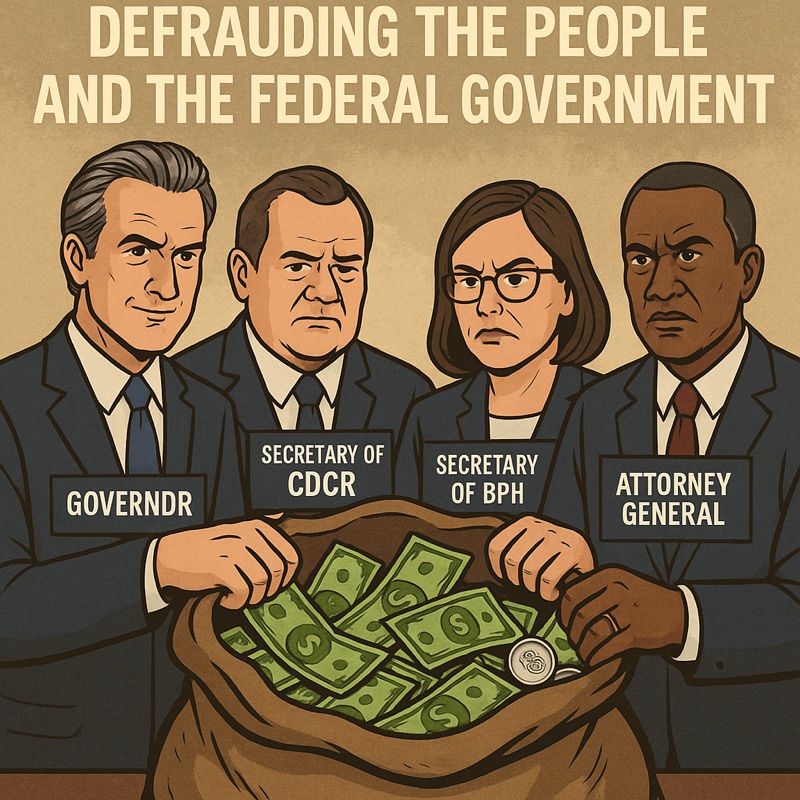
The Hidden Empire: How California’s Top Officials Are Defrauding the People and the Federal Government
By Devon T. White | ThaWilsonBlock Magazine
Behind the polished podiums and carefully worded press releases lies a hidden empire — one built not on justice, but on deception. California’s Governor, the Secretary of the California Department of Corrections and Rehabilitation (CDCR), the Secretary of the Board of Parole Hearings (BPH), and even the Attorney General’s Office have turned public administration into a self-sustaining criminal enterprise — financed by federal dollars and taxpayers who are unaware that they’re footing the bill for fraud.
The Illusion of Rehabilitation
The cornerstone of this deception is the false claim that California’s prison and parole systems serve rehabilitation and public safety. In reality, they serve financial self-preservation.
Each year, the state accepts billions in federal grants and reimbursements earmarked for lawful incarceration, education, and re-entry services. But when individuals are held under void judgments, expired determinate terms, or illegally extended parole jurisdictions, those funds are misapplied — transforming lawful appropriations into fraudulent claims against the U.S. Treasury.
When CDCR and BPH knowingly detain people whose sentences have been legally discharged, they not only commit false imprisonment, they also violate the False Claims Act (31 U.S.C. § 3729) by submitting reports and requests for reimbursement tied to unlawful custody.
The Chain of Complicity
The fraud doesn’t happen in isolation — it’s systematic and hierarchical:
- The Governor — as chief executive — signs budgets and allocates funds while ignoring clear constitutional violations occurring under his watch. His silence equals complicity.
- The CDCR Secretary — authorizes the continued housing and programming of individuals whose legal terms have expired, effectively billing the public for confinement with no legal foundation.
- The BPH Secretary — manufactures jurisdiction through parole hearings for individuals who were never released on parole, falsely inflating caseload statistics to justify federal oversight and budget extensions.
- The Attorney General — defends these illegal practices in court, shielding the fraud behind doctrines of “custodial discretion” and “administrative interpretation,” even when state law says otherwise.
Together, they form an interlocking network of administrative deceit — a scheme that exploits the language of law while violating its substance.
The Legal Framework They Ignore
California law is clear:
- Penal Code § 15: No penalty may exist without a conviction for a public offense.
- Penal Code § 669: The determinate term must be served first; once complete, custody must transition to parole supervision or end altogether.
- Penal Code § 3000(a)(1): Parole begins only after release — not before, and not while a person remains incarcerated.
- Title 15, § 3075.2: BPH jurisdiction extends only to actual parolees.
When CDCR and BPH continue to apply parole statutes to individuals who have never been released, they fabricate jurisdiction. That fabrication becomes the foundation of budget requests, custody reports, and funding applications — each one a fraudulent instrument submitted under color of law.
The Economic Engine of Injustice
This machinery of deceit is driven by profit. The state receives financial incentives for “rehabilitation programs,” “educational opportunities,” and “mental health services” that are supposedly tied to lawful custody. But when the underlying imprisonment is void, the money becomes stolen property — laundered through state contracts and agency payrolls.
Each illegally confined individual represents thousands of dollars in federal matching funds, staff salaries, and institutional bonuses. The state’s incentive to keep people imprisoned unlawfully has evolved into a carceral investment strategy, where human beings are the commodities and false paperwork is the currency.
Constitutional Crimes in Plain Sight
This conduct violates not just California law, but federal law as well:
- 18 U.S.C. § 241–242 — Conspiracy and deprivation of rights under color of law.
- 18 U.S.C. § 1001 — False statements and reports to a federal agency.
- 18 U.S.C. § 1346 — Honest services fraud.
- 18 U.S.C. § 1956 — Money laundering of unlawfully obtained federal funds.
Each administrative decision that extends unlawful custody or manipulates jurisdictional data constitutes a continuing federal offense, masked as routine governance.
The Human Toll of Bureaucratic Greed
Behind the statutes and spreadsheets are lives — fathers, mothers, and children separated by a system that values profit over principle. Every unlawful day spent behind bars is not only a constitutional violation but an act of state-sponsored theft from the families, communities, and taxpayers of California.
This fraud drains more than money — it drains faith in justice, it drains opportunity from communities of color, and it drains hope from every person who believes the system can correct itself.
Restoring Law and Accountability
The solution begins with exposure.
Independent auditors, federal investigators, and civil rights attorneys must demand forensic audits of CDCR and BPH’s budget reports, inmate population data, and federal grant filings. Oversight agencies must investigate every case where confinement extends beyond the determinate term or where parole statutes are applied without lawful release.
It’s time for the people of California to see this for what it is — a racketeering enterprise cloaked in bureaucracy.
Justice will not come from within the system; it must come from the people standing outside of it — informed, united, and unafraid.
Closing Statement
The California Constitution begins with the words: “All political power is inherent in the people.”
That power has been stolen, repackaged, and sold back to us as safety and reform.
It’s time to repossess it — and expose the lie that built an empire on the suffering of the innocent.


Comments
Post a Comment